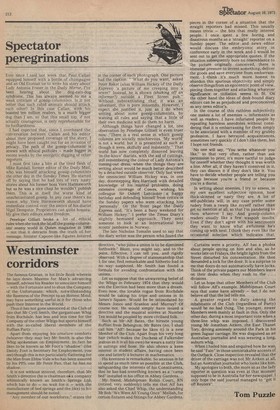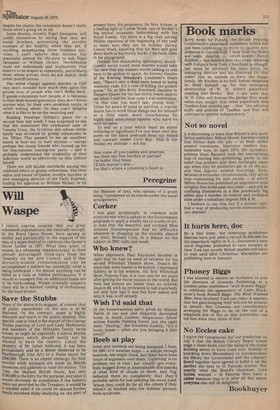Spectator peregrinations
Ever since I said last week that Paul Callan equipped himself with a bottle of champagne and an Old Etonian tie to write his story about Lady Antonia Fraser in the Daily Mirror, I've been hearing about the dog-eats-dog syndrome. This has always seemed to me a weak criticism of gossip-columnists. Is it not better that such rabid animals should attack each other? In this case Callan, with his boasted ten million readers, is a much bigger dog than I am, so that this small nip, if not actually courageous, is only reprehensible for its foolhardiness.
I had expected that, since I overheard the conversation between Callan and his editor about their proposed coverage of the story, I might have been caught out for an invasion of privacy. The path of the gossip-columnist is strewn with ethical potholes — made bigger in recent weeks by the energetic digging of other reporters.
I must first take a bite at the tired flesh of Mike Randall, former editor of the Daily Mail, who was himself attacking gossip-columnists the other day in the Sunday Times. He started off by saying that he had lots of very nasty stories about his former boss Vere Harmsworth but as he was a nice chap he wouldn't publish them. This is in itself the worst kind of unsubstantiated gossip. In any case there's no reason why Vere Harmsworth should have immediate control over the antics of his diarist Nigel Dempster. Proprietors can quite honorably give their editors some freedom.
Penelope Gilliatt broke a lot of ethical rules when she took the lidoff the gossip-columnists' seamy world in Queen magazine in 1960 — not that it detracts from the truth of her message. Sinister Capone-like figures loitered in the corner of each photograph. One picture had the caption: ''What do you want,' asked Peter Baker (alias William Hickey of the Daily Express) 'a picture of me creeping into a sewer?' Instead, he is shown (shaking off an informer?) outside a Fleet Street pub," Without substantiating that it was an informant, this is pure innuendo. However, I expect she justified it, just as I do when writing about some gossip-columnists, by waiving all rules and saying that a little of their own Medicine will do them no harm.
Although things have changed a lot, one observation by Penelope Gilliatt is even truer now: "There is a real sense in which gossip columns are socially mischievous. 'My world' is not a world: but it is presented as such as though it were, skilfully and insistently." That world has now completely dissoved leaving 1n-the-know' diarists, with the aid of cuttings, still remembering the colour of Lady Antonia's coming-out dress, when the things they are writing about would be much better described by a detached outside observer. Only last week the omniscient William Hickey was, in one day, doorstepping Rex Harrison with detailed knowledge of his marital problems, doing extensive coverage of Cowes, wishing his colleague Sir Osbert Lancaster a happy birthday and defending himself from critics in the Sunday papers who were attacking him 'personally'. On the front page the Daily Express said, "It's been a busy weekend for !William Hickey." I prefer the Times Diary's slightly bemused approach. They sent someone to look at an international boy scouts' jamboree in Norway.
The late Nicholas Tomalin used to say that the diary writer was the person who found the
pieces in the corner of a situation that the straight reporters had missed. This usually means trivia — the bits that really interest people. I once spent a few boring and disastrous months as a 'straight' reporter on a Sunday paper. The editor and news editor would discuss the embryonic story in conference early in the week and I would be sent out to get the appropriate quotes. If the situation subsequently bore no resemblance to he picture originally conceived, there is immense pressure to invent something, deliver the goods and save everyone from embarrassment. I ghink it's much more honest to abandon this spurious objectivity and simply observe things from an egocentric point of view, piecing them together and attaching whatever Significance or titillation seems to fit. OnT the other hand the ideas of desk-bound diary editors can be as prejudiced and preconceived as any news editor's.
In the course of this ruthless subjectivity one makes a lot of enemies — informants as well as readers. I have infuriated people by repeating harmless anecdotes without considering that it is embarrassing for them simply to be associated with a member of my grubby profession. I have betrayed acquaintances, sometimes very quickly if I don't like them, but I hope not friends.
'No one will say, "You write Whatever you like," so that very often, rather than ask permission to print, it's more tactful to judge for oneself whether they thought it was worth a line. After all, if they haven't connived in it, they can disown it if they don't like it. You have to decide whether people are telling you things because you're a friend or because you're a diarist.
In writing about enemies, I try to assess, in my own excellent subjective opinion, how thick-skinned or nasty they are. A lot of self-publicists will, in any case prefer some rudery from a twerp like myself rather than get no mention at all, so that I'm pandering to them whatever I say. And gossip-column readers usually like a few waspish insults. Even if they don't agree with his sentiments they want to know what awfulness he's coming up with next. I think they even like the occasional solecism which indicates that, despite his claims, the columnist doesn't really know what's going on at all.
Some diarists, notably Nigel Dempster, will justify themselves by saying that they are social levellers, preventing the terrible excesses of the wealthy when they are, if anything, perpetuating these tiresome activities. I can't believe that anyone has drastically altered his life-style to suit Nigel Dempster or William Hickey. Nevertheless there are individuals and institutions that deserve to be sniped at repeatedly, particularly those whose private lives do{ not match their public pontifications.
The worst charge against diarists is that they don't consider how much they upset the private lives of people who can't strike back. If gossip-columnists hurt people, it is because, in their desk-bound ignorance, they don't know anyone who, by their own snobbish terms, is worth writing about. So they can't imagine what it is like to be on the receiving end.
Reading Penelope Gilliatt's piece for a second time last week, I was surprised to see that she mentioned the celebrated case of Venetia Crust, the fictitious deb whose entire family was invented by gossip columnists in the 'fifties. This seemed to me an excellent lesson in how not to hurt anyone — except perhaps the crusty friends who turned up for her non-existent coming-out party — and it probably undermined the credibility of that ludicrous world as effectively as Mrs Gilliatt herself.
There are still double staridards among the confused ethics of gossip-columnists. The then editor and owner of Queen, Jocelyn Stevens, is now managing director of the Daily Express, lending his approval to William Hickey in its present form. His proprietor, Sir Max Aitken, is a leading light at Cowes Week, one of Hickey's big annual occasions, hobnobbing with the Royal Family. Yet there is a big rush among Hickey reporters at the beginning of the year to make sure they are on holiday during Cowes Week, knowing that Sir Max will give short shrift to his thirsty hacks if he finds them in his playground.
Outside this diminishing ephemeral, anachronistic social world, most diarists would take the view that any contact worth talking to will have to be spoken to again. As Jeremy Deedes of the Evening Standard's Londoner's Diary says, "There's only a short-term bonus in being wantonly rude. It's a case of killing the'golden goose." Or, as Mrs Betty Kenward, Jennifer in Harpers/Queen for the last thirty years, said to me when I told her how rude I was sometimes, "In that case you won't last, young man." Either for peace of mind or survival, a regular diarist has to work these things out for himself in a field made more treacherous by highly-paid anonymous tipsters who have no such scruples.
To end on a note which must be either titillating or significant I've just been sent this poem on the latest postcard from my friend and constant reader Cyril Ray. This is (he thinks) my attitude — not his: Now come all you toadies and smarties, Are there any free lunches or parties? I'm bolder than brass: I'll lick anyone's arse — For that's where a columnist's heart is.
Peregrine



































 Previous page
Previous page